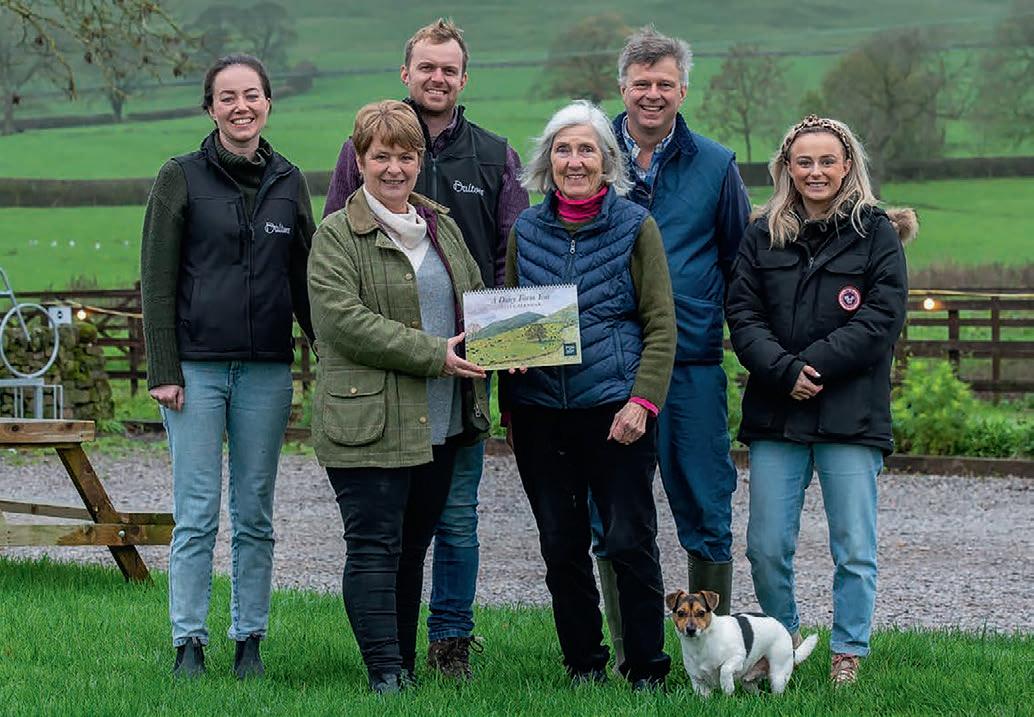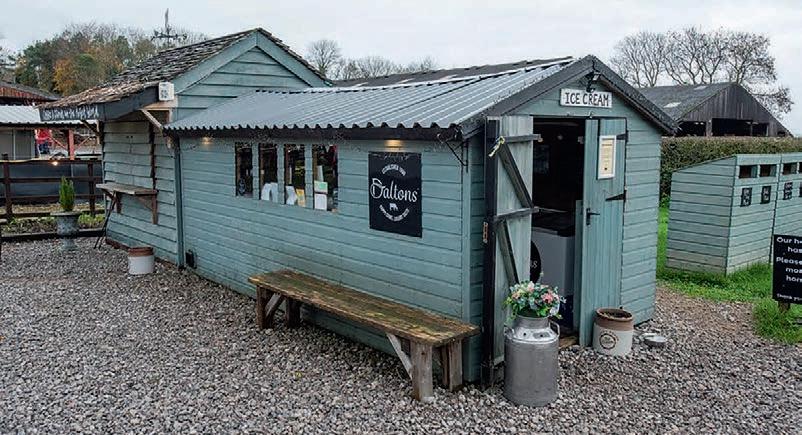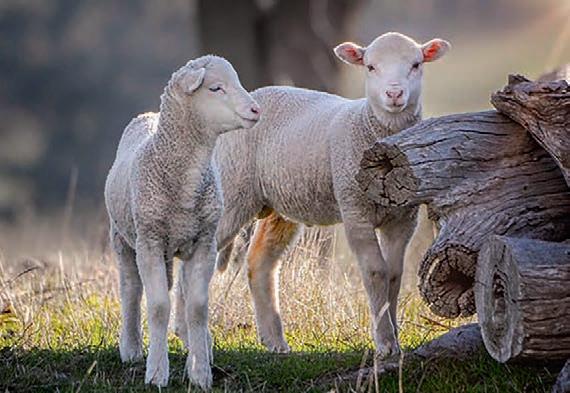
7 minute read
World
Keeping a date with community care, wellbeing
The Dalton family of Derbyshire in the United Kingdom have had a tough year after losing someone close. Now, via a special calendar of images, they are hoping to help others in the community.
AT SHAWCRAFT Farm it is an all-hands-on-deck approach and there is a place for everyone. Sue Dalton and her family run a thriving dairy business in Ashbourne, Derbyshire, where her husband Angus is chief butter maker and her daughter Rosie heads up the ice-cream enterprise.
Sue, along with her son Henry and his wife Rosa, take care of the 450 cows.
Sue and Angus have their own story, as both are first-generation farmers. Sue was a radiographer and Angus worked in factory management. But Angus had always wanted to work with cows.
“He got a job as a herdsman and worked his way up,” Sue said. “We worked around the country on various jobs, then got a county council farm in Wales in 1996, moved up the ladder of tenancies and are now on a private tenancy.”
They have been at Shawcraft for 20 years and now run 450 Kiwi crosses across 320ha, all on a grass-based system.
Over the years, they have changed their system to suit their farm – the crosses, which are Holstein-Friesians and Jerseys, give the best of both breeds and are milked just once a day.
“We have bred our own little cow, which is perfect for walking, eating and producing a good quality milk. They are not highyielding Holsteins. It has evolved and it suits our farm,” Sue said.
“When we got the cows in all the time and were feeding total mixed ration and buying in feed, there was no profit, so we had to do something.
“It is a very low-input system – obviously it is low output, but it is [about] the quality of the milk.”
Their main contract is with Yewtree Dairy and they also sell to a cheesemaker who makes Staffordshire cheese.
The original move into ice cream and butter came after both their children wanted to come home to farm.
The business expanded and you can now buy ice cream, butter and coffee through their honesty shop, all under the brand Dalton’s Dairy.
“Henry came home and wanted to farm after university, and so did Rosie, who studied marketing and economics,” Sue said.
“We all wanted to add value to the milk, but we needed to make sure there was a market for our products and the business could grow sufficiently to employ Henry and Rosie.
“It has added value to our milk – in quite a small way, but it is a brand and it is about getting the story across that these cows are grass-fed.
“People love that story. They can see the cows in the field and people take pride in bringing their friends back.
“Farmers do not tell their story enough. We have started selling our butter into London now and they love that my son has milked the cows and Angus has made the butter.
“I know it is all very artisan, but people are connecting in a way they did not five years ago.
“It has created enough employment to support three families in a way.”
Across the year, butterfat averages 5.4% and protein is about 4.2%. The yield per cow is an average of 3,600l, with the business aiming to get as much milk from grass as it can.
They spring calve from early March until the end of April.
“We breed from the best using artificial insemination and breed enough to replace. The rest are put to Aberdeen-Angus bulls and we have one private calf buyer,” Sue said.
The farm is part of the UK’s Higher Level Stewardship scheme, but the biggest change came when they decided to milk once a day and put concrete sleepers down to enable cows to get out.
“It is not the best ground in the world – it is quite heavy and quite a long drawn-out farm, so it is quite a way for cows to walk.
“Bovine TB has been a big problem for us too, but thankfully we have had clear tests.”
In November 2021, the news came that Rosa’s father, Mike Malseed, had taken his own life.
The Dalton family and the Malseed family were close. Rosa’s father farmed in Chagford on Dartmoor, Devon, and had run a beef, sheep and turkey enterprise.
Mike, who was just 62 when he died, has been described as “the lynchpin” and a well-respected farmer. His death sent shockwaves through the farming community.
“He had a crisis around a year ago and could not cope after a lot of issues came all at once for him,” Sue said.
“The last cow through tested positive for bTB and he was worried about feed.
“Normally, he would have coped with it all, but perhaps covid-19 escalated it too, with people being isolated.
“Before he got any proper help, he took his own life. Absolutely nobody saw it coming.”
The past two years have been difficult for the farming community, given the extreme weather conditions, poor harvests and, of course, a global pandemic.
Research earlier this year from the Farming Safety Foundation revealed 92% of UK farmers under the age of 40 said poor mental health was the biggest hidden problem farmers face.
This time of year can also prove difficult for many, but Sue and her family are hoping to help others by raising money for a UK agricultural charity, the Farming Community Network (FCN), by selling a calendar inspired by Shawcraft farm.
Friend and local artist Lee Mackay had recently completed 40 oil paintings entitled A Dairy Farm Year.
“We had not realised she had been coming to the farm and then going home to paint. She had produced more than 40 oil paintings,” Sue said.
“Someone in the village suggested a calendar should be made and sold in honour of Mike’s life, and Rosa liked the idea.”
The calendars will all be available to buy at the farm’s honestly shop so that “hopefully this does not have to happen to another man, farmer or family’, she said.
“We as a family are going to pay for the printing and 100% of the proceeds will go to the charity.”
Rosa is hoping the calendar can connect to rural families and she is keen to encourage people to reach out.
“The aim of the calendar is to raise funds to increase the awareness and warning signs of mental health to prevent this happening to another farming family,” Rosa said.
“All proceeds from the calendar will go to FCN and the work it does to widen awareness and provide support to rural communities.
“Christmas can be a lonely time, especially on farms where animals need to be fed, jobs need to be done and there is no real break from work.
“It is important to look out for each other. You can be lonely even in a crowd. You do not have to keep a lid on all your problems and bottle up feelings.
“Asking for help is not a weakness; it is brave and positive.”
Farmers Guardian
Christmas can be a lonely time, especially on farms where animals need to be fed, jobs need to be done and there is no real break from work. It is important to look out for each other.
Rosa Dalton Shawcraft farm
ADDED VALUE: The Dalton’s Dairy honesty farm shop, where the family sell their own ice cream and other products. FAMILY AFFAIR: Back row, from left, Rosa, Henry, Angus and Rosie Dalton. Front row: Sue Dalton and artist Lee Mackay.

MORE:
Suffering from depression or stress, or know someone who is? Where to get help: RURAL SUPPORT TRUST: 0800 RURAL HELP DEPRESSION HELPLINE: 0800 111 757 LIFELINE: 0800 543 354 NEED TO TALK? Call or text 1737 SAMARITANS: 0800 726 666 YOUTHLINE: 0800 376 633 or text 234
Lamb trumps wool in Aus outlook
AUSTRALIAN producers separate the sheep from the fleece when asked to predict where prices will go for lamb and wool.
Meat & Livestock Australia (MLA) market analyst Jenny Lim said: “Despite ... concerns, producer sentiment around the sheepmeat industry is extremely positive moving forward, with a 67% net-positive rating among sheepmeat producers in Australia.”
However, sentiments were less positive for the wool sector, with only a 12% net-positive rating.
Auction marts and saleyards continued to be the dominant sales channel for producers, with MLA highlighting the importance of this sales method to the industry as a whole. A total of 58% of participants said saleyard auctions are the main channel they use to sell their sheep.
This is particularly strong in New South Wales, where 73% of farmers use marts to sell their stock.
Larger producers are more likely to use direct sales.
Farmers Guardian SALEYARDS: A total of 58% of participants in a recent survey say saleyard auctions are the main channel Australian farmers use to sell their sheep.


